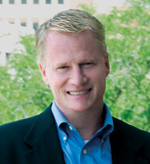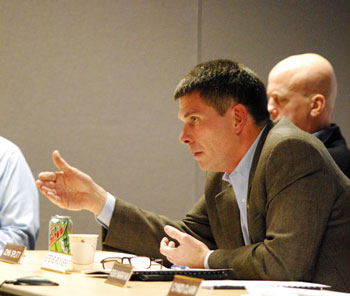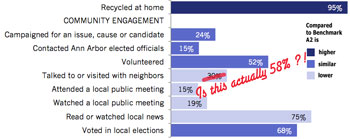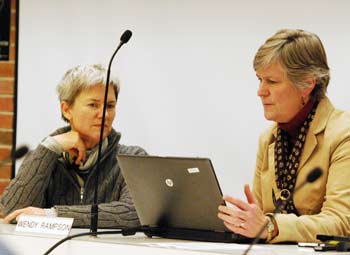The annual budget planning session of the Ann Arbor city council will start sometime after 4 p.m. on Monday, Dec. 9 in the jury assembly room of the Justice Center adjoining city hall. The uncertain actual start time of the planning session is due to a special meeting of the council that has now been called to start at 4 p.m. in city council chambers.
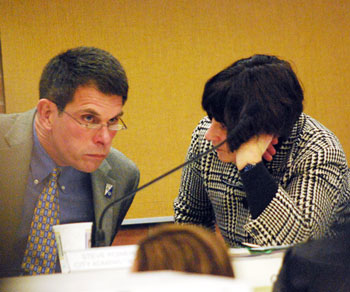
City administrator Steve Powers and Jane Lumm (Ward 2) just before the Nov. 18, 2013 council meeting started – a conversation Lumm wrote about after the meeting in an email thread to other councilmembers.
The special meeting will include a closed session – based on written attorney-client privileged communication and land acquisition. The land acquisition likely relates to the pending sale of the Edwards Brothers property on South State Street to the University of Michigan for $12.8 million, which was announced in a Nov. 27 press release. The business had signaled its intent to put the property on the market in late July.
A right of first refusal on the property is held by the city of Ann Arbor as a condition of a tax abatement granted by the city council almost three years ago, on Jan. 18, 2011. Purchase by the university would remove the property from the tax rolls. Washtenaw County records show the taxable value of the property at just over $3 million.
The closed session to be held on Dec. 9 follows some friction among councilmembers about the way information was shared with the council about the sale. That friction resulted from comments overheard by Jane Lumm (Ward 2) just before the council’s Nov. 18 meeting started, which prompted her to email her council colleagues expressing her dissatisfaction that not all councilmembers had been kept in the loop.
The email thread, provided to The Chronicle in response to a Freedom of Information Act request, goes on to include a query by Lumm to UM director of community relations Jim Kosteva for information about the status of the Edwards Brothers property, followed by an admonishment to Lumm from Christopher Taylor (Ward 3) that there were scenarios under which Lumm’s inquiry could potentially be detrimental to the city’s interest. The thread includes a note from Chuck Warpehoski (Ward 5) that indicates concern that the issue should appropriately be discussed in a closed session under the state’s Open Meetings Act, not in an email thread among all councilmembers.
The email thread includes a clarificational inquiry to Taylor from Jack Eaton (Ward 4), as well as a note from Sabra Briere (Ward 1) about news coverage of the Edwards Brothers property sale. Eaton, Briere and Lumm signed the call to the Dec. 9 special meeting, which any three councilmembers can do under the city charter.
After the special meeting and its closed session, the council will move to the jury assembly room at the adjoining Justice Center for its annual budget planning session. That session could include an airing out of the issue of shared information – under an agenda item labeled “Articulating Mutual Expectations.” More specifically, the item indicates that the council will “identify and discuss mutual expectations for governing together” with the following desired outcome: “Articulate and agree on mutual expectations for members of the governing body.”
The background materials that have been provided to the council in preparation for the planning session include draft copies of reports with results from the National Citizens Survey that was conducted in the fall of 2013 by mailing a questionnaire to a random sample of 3,000 city residents, 778 of whom completed surveys. [.pdf of draft Ann Arbor National Citizens Survey report] [.pdf of responses, benchmarks, methodology and questionnaire]
The survey covered a broad range of topics. For example, 55% of survey respondents indicated that they rely at least somewhat for their news and information on online newspapers and media. That compares to 37% who said they rely some for news on printed newspapers. More respondents than that said they rely on news from the city website specifically (44%) or on radio stations (41%).
But questions about public safety – one of the top three priorities identified at last year’s planning session – will likely be of greater interest for councilmembers who will be weighing budget decisions at this year’s session. In general, under the community characteristics portion of the survey, 89% of Ann Arbor survey respondents rated their overall feeling of safety as good or excellent, with ratings for neighborhood safety at 97% and for downtown/commercial area safety at 92%. Those numbers are similar to the set of benchmarked communities that participated in the survey. The council’s measure of success for public safety includes the idea that residents should perceive the community as safe.
For the open-ended response survey item, which asked respondents to identify the city leaders’ top three priorities to maximize the quality of life in Ann Arbor, public safety was one of the top three items, with 19% of the open-ended responses identifying safety, crime and police as a concern. Also cited in 19% of responses were government, taxes and communication. However, the dominant concern in the open-ended responses was mobility issues – as 57% of responses were coded as related to roads, transportation, traffic, traffic enforcement, bikes and pedestrians.
That survey result mirrors the wide participation by the community in the recent debate about the repeal of the city’s crosswalk law. That debate ended in a city council vote on Dec. 2, 2013 to modify significantly the existing ordinance. But mayor John Hieftje announced immediately following the vote that he intended to exercise his power of veto.
The priority placed on the topic by the public and by councilmembers will also be reflected in two anticipated agenda items for the council’s Dec. 16 meeting. Christopher Taylor (Ward 3) is expected to bring forward a resolution directing the city administrator to present a plan for funding elements of the recently adopted update to the city’s non-motorized transportation plan. And Stephen Kunselman (Ward 3) has told The Chronicle he expects to bring forward a resolution on Dec. 16 that would allocate $500,000 from the general fund reserve this year to pay for police overtime to conduct traffic enforcement.
How police officers use their time while on duty is part of a report the council has been provided in preparation for the Dec. 9 budget planning session. Initial results from a newly implemented (Jan. 1, 2013) electronic timesheet logging system appear to indicate that police officers have at least 40% of their time that’s either unassigned or dedicated to proactive policing and community engagement. At last year’s planning session, the council had defined a success statement for public safety that included a goal of 25-30% time available for proactive policing.
The sequence of a special city council meeting followed by the budget planning session was also played out last year in mid-December. That’s when the council convened a special meeting to take a vote protesting the establishment of the southeast Michigan Regional Transit Authority. Like last year, the council’s budget planning session will be led by Julia Novak of the Novak Consulting Group.
Material presented in this article includes an annotated email thread about the Edwards Brothers property sale – which started in the Nov. 19 early morning hours, after the council meeting ended. [Full Story]




